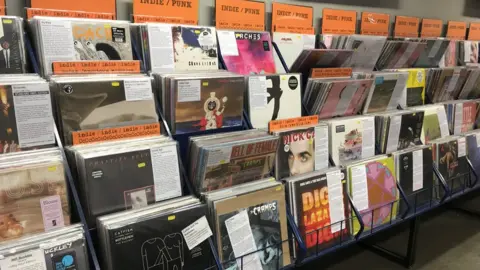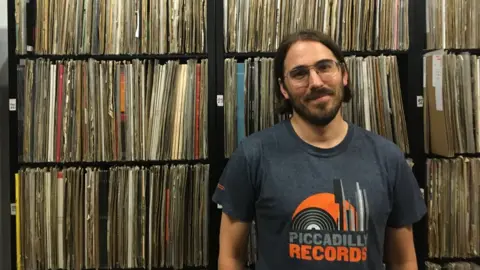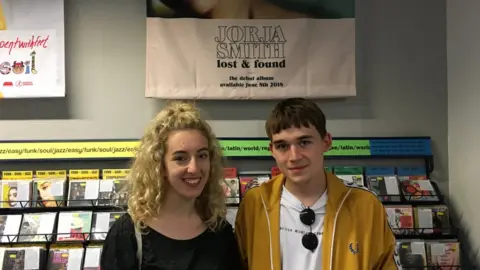Wolf Alice and James Bay want plastic wrap ditched on records
 BBC
BBCHowever many records you've got, there's still something exciting about tearing off the cellophane cover on a new album.
But there are demands for that cellophane cover to be scrapped.
Along with things like plastic straws, shopping bags and water bottles, there are growing calls to get rid of single-use plastic.
And that fight is now coming to the music industry and its first target is shrink wrapping.
 Getty Images
Getty ImagesAnna Harvey is Head of Vinyl at Silva Screen Records.
They released Blue Planet 2 on vinyl and made the decision not to shrink wrap it. Not a bad idea since the show highlighted plastic waste.
"Instead, we used a paper band to hold the vinyl and its sleeve together," she tells Newsbeat.
It's about changing habits as much as anything else.
Karen Emanuel runs an independent music manufacturer called Key Production. She is working with Anna to campaign for the end of single-use plastic in the music industry.
"I think it is just like plastic bags in supermarkets," Anna says.
"Most consumers want our environment to be clean and pollution free so it is just a matter of making that connection.
Karen says they need to get retailers and distribution companies involved.
"We are already speaking to manufacturers to see if we can get some alternatives, corn starch instead of shrink wrap or using paper bands and stickers on DVDs and CDs."

But what about the people actually buying the records.
Patrick Ryder is the manager at Piccadilly Records in Manchester. He says if a plastic cover has a tear in it, people can be put off buying.
"It will probably get sold but someone might ask to swap it for one that has its shrink wrap intact," he tells us.
"I understand why labels use shrink wrap for special editions or if there is a download code inside - without the shrink wrap they will fall out.
"But the solution to that is putting a sticker on the record."

James Yates and his friend Alex Bello are two of his customers.
"I just don't think there is a need for it," they both agree.
"Times are moving on and people are starting to get a bit more clued up about the environment," adds James.
"I don't think it needs to be banned altogether, maybe for the more expensive records, it keeps them nicer.
"For the everyday records, there is no need for plastic."
Artists are on board too - with Wolf Alice saying it's a huge priority for them.
"We always have said from day one that we want to make our releases as environmentally friendly as possible," Drummer Joel Amey says.
"Our CD sleeves are all made from cardboard not plastic, what's the point? You only take it off anyway," added singer Ellie Rowsell.
 Getty Images
Getty ImagesJames Bay admits he hadn't really thought about the shrink wrapping but is against it.
"They are filling up the ocean, it is doing lots and lots of damage so wherever you find these single use plastics let's try not to use them."
It is up to record labels too. Warner didn't want to comment on their policy. We didn't hear back from Universal and Sony.
The record itself is made of PVC and currently there isn't an eco-friendly material that gives the same sound quality.
But there is a lot of waste in production. GZ Media in the Czech Republic is the largest manufacturer of vinyl in Europe.
Their boss Michal Sterba says reducing plastic waste is a priority.
"We are working on a huge programme internally right now on how to reuse everything that we waste," he explains.
"We started a project a year ago where we make records out of the waste. 50% of the waste is now going to landfill.
"I think in a year or two there will be zero going to landfill."
Follow Newsbeat on Instagram, Facebook and Twitter.
Listen to Newsbeat live at 12:45 and 17:45 every weekday on BBC Radio 1 and 1Xtra - if you miss us you can listen back here.
